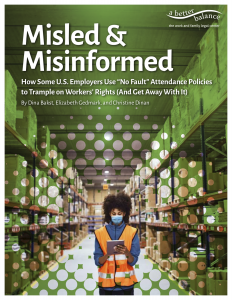EXECUTIVE SUMMARY
 As reports of COVID-19 outbreaks at several major meatpacking plants began to emerge in April 2020, tragically resulting in some workers’ deaths and leading to rare plant closures, the danger posed by an employee reporting to work sick was suddenly laid bare. But the strict “points-based” attendance policies favored by some of the country’s biggest employers—including the meat and food processing, manufacturing, and retail companies that have become essential during these frightening times—virtually ensure that this risk will remain.
As reports of COVID-19 outbreaks at several major meatpacking plants began to emerge in April 2020, tragically resulting in some workers’ deaths and leading to rare plant closures, the danger posed by an employee reporting to work sick was suddenly laid bare. But the strict “points-based” attendance policies favored by some of the country’s biggest employers—including the meat and food processing, manufacturing, and retail companies that have become essential during these frightening times—virtually ensure that this risk will remain.
“No fault” attendance policies, as they are often called, are used by some of the nation’s largest companies—Walmart, Amazon, Tyson Foods, ConAgra Foods, FedEx, among many others—to encourage workers to show up for their shifts and penalize them when they do not. Yet too frequently, these attendance policies are used to infringe on workers’ rights by punishing them with “points” or “occurrences” for absences that are legally protected, including time off for serious medical needs. Despite the existence of hard-fought workplace protections like the Family and Medical Leave Act, the Americans with Disabilities Act, and paid sick time laws, workers are still being punished for taking time off to care for themselves or their loved ones.
After analyzing the “no fault” attendance policies of sixty-six U.S. employers, including several major companies, whose policies impact approximately 18 million workers, as well as dozens of cases involving legal challenges to such policies, it has become clear that “no fault” attendance policies consistently share a common set of faults: they fail to inform workers about their rights to time off without punishment for certain medical, pregnancy-related, and caregiving needs, and they are designed to operate in ways that make it nearly impossible for workers to exercise those rights.
KEY FINDINGS
Employers’ “no fault” attendance policies reliably fail to inform workers about their legal rights to take time off without punishment for certain illnesses, health conditions, or disabilities, or for the need to care for an ill loved one under state, local, or federal law. Specifically:
- Employers’ “no fault” attendance policies regularly provide incomplete or misleading information to workers regarding their right to time off under the federal Family and Medical Leave Act (FMLA). For instance, only one of the 66 policies surveyed made clear that FMLA leave can be used during pregnancy. Some policies indicated that FMLA leaves must always be approved in advance, which is plainly wrong. Others incorrectly implied that employees would only be protected by the FMLA if they were absent for a period of several days.
- Despite the fact that many of the employers whose policies we reviewed are operating in states and localities with paid sick time laws, many of these attendance policies failed to include information about these rights or indicate that workers will not receive occurrences for sick time. Indeed, the vast majority of the policies that we reviewed clearly indicate that workers will incur points when they miss work because they are sick. In fact, employers sometimes assess points even if workers are ordered to go home due to illness.
- Over 80% of the policies surveyed failed to make clear that employees will not receive points for qualifying disability-related absences pursuant to the Americans with Disabilities Act (ADA). Of the few policies that mentioned the ADA, even fewer mentioned the term “disability” or explained that accommodations could include time off for disability-related absences, and none indicated that pregnancy-related disabilities may be protected, as they are under the Americans with Disabilities Act Amendments Act (ADAAA).
- Only two policies mentioned the right to accommodations, including time off for pregnancy-related conditions, under a state Pregnant Workers Fairness Act (PWFA), despite the fact that many of the companies whose policies we reviewed are operating in states and localities with these protections.
“No fault” attendance policies are also often problematic in practice, since many employers’ policies make it extremely difficult, if not impossible, for employees to provide details when they need to call out sick or submit medical documentation, and rigid attendance practices do not adequately account for emergencies, disproportionately harming the most vulnerable workers:
- More than one-third of the policies that we reviewed contained no mention of medical documentation whatsoever. Others allowed workers to submit a doctor’s note only to reduce the number of points for an absence, but never to excuse them from points altogether.
- Only 12% of the policies that we reviewed acknowledged that emergencies might prevent a worker from complying with an employer’s call-out requirements, and fewer than 10% outlined a process for employees to seek removal of points that have been assessed.
This report looks at why this is happening and how we can fix it. We propose a set of recommendations, including state and federal legislation that will ensure that employers cannot use attendance policies to interfere with workers’ rights—or face increased penalties for doing so. We also urge Congress to exercise oversight to ensure that the major corporations that utilize attendance policies are fully compliant with civil rights and labor laws and fully transparent about their policies.




